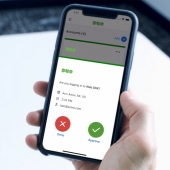-
Chipmaker Nexperia confirms breach after ransomware gang leaks data
Dutch chipmaker Nexperia confirmed late last week that hackers breached its network in March 2024 after a ransomware gang leaked samples of allegedly stolen data.
- April 15, 2024
- 12:00 PM
 0
0
-
Daixin ransomware gang claims attack on Omni Hotels
The Daixin Team ransomware gang claimed a recent cyberattack on Omni Hotels & Resorts and is now threatening to publish customers' sensitive information if a ransom is not paid.
- April 15, 2024
- 11:01 AM
 0
0
-
Cisco Duo warns third-party data breach exposed SMS MFA logs
Cisco Duo's security team warns that hackers stole some customers' VoIP and SMS logs for multi-factor authentication (MFA) messages in a cyberattack on their telephony provider.
- April 15, 2024
- 10:52 AM
 0
0
-
Palo Alto Networks fixes zero-day exploited to backdoor firewalls
Palo Alto Networks has started releasing hotfixes for a zero-day vulnerability that has been actively exploited since March 26th to backdoor PAN-OS firewalls.
- April 15, 2024
- 08:59 AM
 1
1
-
Microsoft lifts Windows 11 block on some Intel systems after 2 years
Microsoft has finally lifted a compatibility hold blocking Windows 11 upgrades on systems with Intel 11th Gen Core processors and Intel Smart Sound Technology (SST) audio drivers.
- April 15, 2024
- 07:42 AM
 0
0
-
OpenTable won't add first names, photos to old reviews after backlash
OpenTable has reversed its decision to show members' first names and profile pictures in past anonymous reviews after receiving backlash from members who felt it was a breach of privacy.
- April 14, 2024
- 06:28 PM
 3
3
-
Medium bans AI-generated content from its paid Partner Program
Medium is banning AI-generated content from its paid Partner program, notifying users that the new policy goes into effect on May 1, 2024.
- April 14, 2024
- 05:39 PM
 3
3
-
Firebird RAT creator and seller arrested in the U.S. and Australia
A joint police operation between the Australian Federal Police (AFP) and the FBI has led to the arrest and charging of two individuals who are believed to be behind the development and distribution of the "Firebird" remote access trojan (RAT), later rebranded as "Hive."
- April 13, 2024
- 10:17 AM
 0
0
-
Hacker claims Giant Tiger data breach, leaks 2.8M records online
Canadian retail chain Giant Tiger disclosed a data breach in March 2024. A threat actor has now publicly claimed responsibility for the data breach and leaked 2.8 million records on a hacker forum that they claim are of Giant Tiger customers.
- April 13, 2024
- 10:00 AM
 0
0
-
Palo Alto Networks zero-day exploited since March to backdoor firewalls
Suspected state-sponsored hackers have been exploiting a zero-day vulnerability in Palo Alto Networks firewalls tracked as CVE-2024-3400 since March 26, using the compromised devices to breach internal networks, steal data and credentials.
- April 13, 2024
- 08:35 AM
 0
0
-
UK flooded with forged stamps despite using barcodes — to prevent just that
Royal Mail, the British postal and courier service began switching all snail mail stamps to barcoded stamps last year. The purpose of the barcode was to enhance security, deter stamp reuse, and possibly prevent forgeries—which it has failed to do.
- April 13, 2024
- 05:05 AM
 3
3
-
Microsoft now testing app ads in Windows 11's Start menu
Microsoft has started testing ads in the Windows 11 Start menu, a new experiment the company says will help users find new "great" apps in the Microsoft Store.
- April 12, 2024
- 04:13 PM
 14
14
-
FBI warns of massive wave of road toll SMS phishing attacks
On Friday, the Federal Bureau of Investigation warned of a massive ongoing wave of SMS phishing attacks targeting Americans with lures regarding unpaid road toll fees.
- April 12, 2024
- 02:56 PM
 1
1
-
Telegram fixes Windows app zero-day used to launch Python scripts
Telegram fixed a zero-day vulnerability in its Windows desktop application that could be used to bypass security warnings and automatically launch Python scripts.
- April 12, 2024
- 02:46 PM
 0
0
-
Ex-Amazon engineer gets 3 years for hacking crypto exchanges
Former Amazon security engineer Shakeeb Ahmed was sentenced to three years in prison for hacking two cryptocurrency exchanges in July 2022 and stealing over $12 million.
- April 12, 2024
- 01:54 PM
 1
1
-
Former AT&T customers get $6.3 million in data throttling refunds
The Federal Trade Commission (FTC) is sending out $6,300,000 in partial refunds to 267,000 former AT&T Wireless customers as part of a data throttling settlement in 2019.
- April 12, 2024
- 11:56 AM
 0
0
-
Roku warns 576,000 accounts hacked in new credential stuffing attacks
Roku warns that 576,000 accounts were hacked in new credential stuffing attacks after disclosing another incident that compromised 15,000 accounts in early March.
- April 12, 2024
- 11:05 AM
 3
3
-
Palo Alto Networks warns of PAN-OS firewall zero-day used in attacks
Today, Palo Alto Networks warns that an unpatched critical command injection vulnerability in its PAN-OS firewall is being actively exploited in attacks.
- April 12, 2024
- 09:28 AM
 0
0
-
CISA makes its "Malware Next-Gen" analysis system publicly available
The U.S. Cybersecurity and Infrastructure Security Agency (CISA) has released a new version of "Malware Next-Gen," now allowing the public to submit malware samples for analysis by CISA.
- April 11, 2024
- 06:27 PM
 0
0
-
OpenTable is adding your first name to previously anonymous reviews
Restaurant reservation platform OpenTable says that all reviews on the platform will no longer be fully anonymous starting May 22nd and will now show members' profile pictures and first names.
- April 11, 2024
- 06:15 PM
 3
3

























